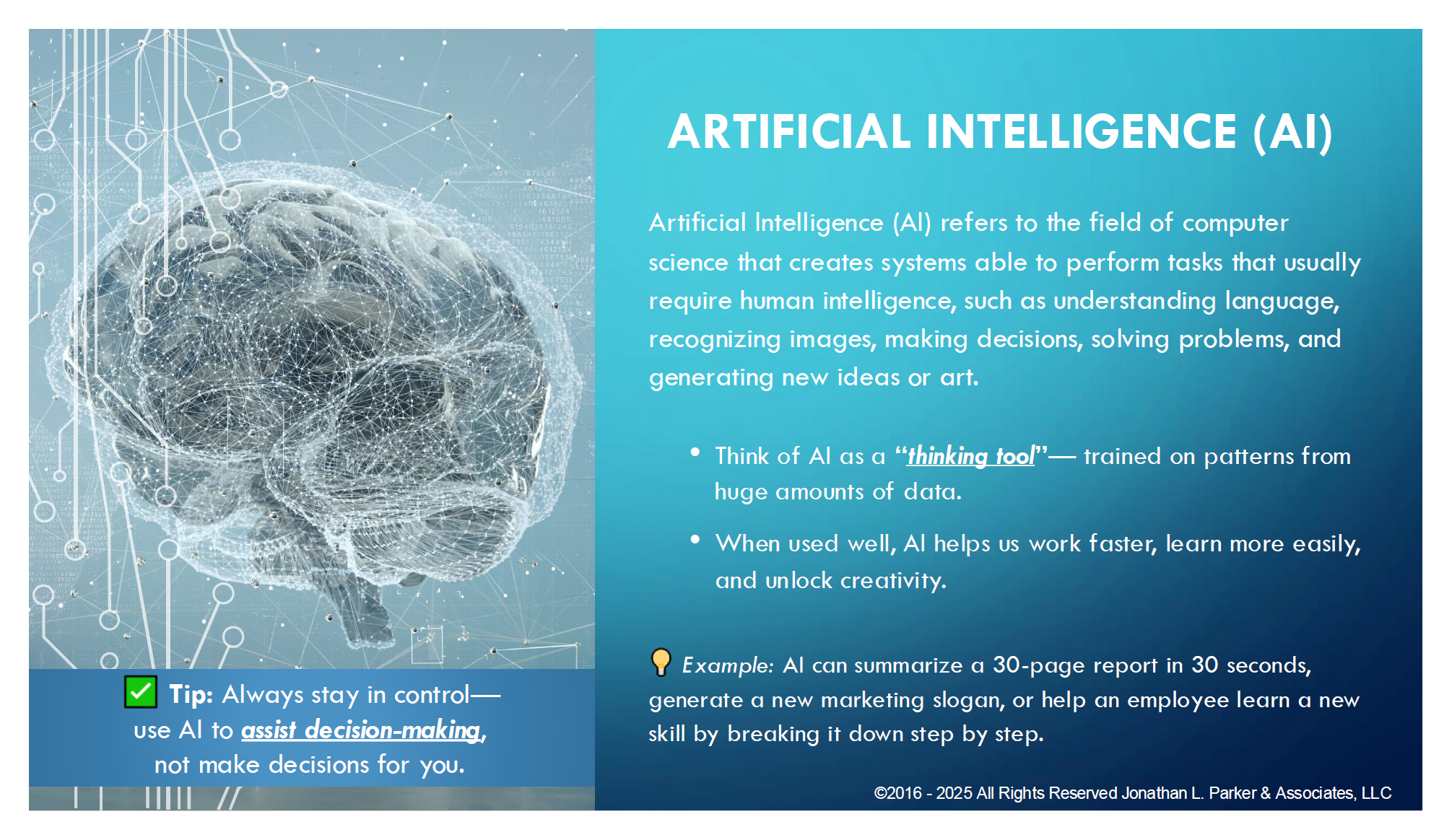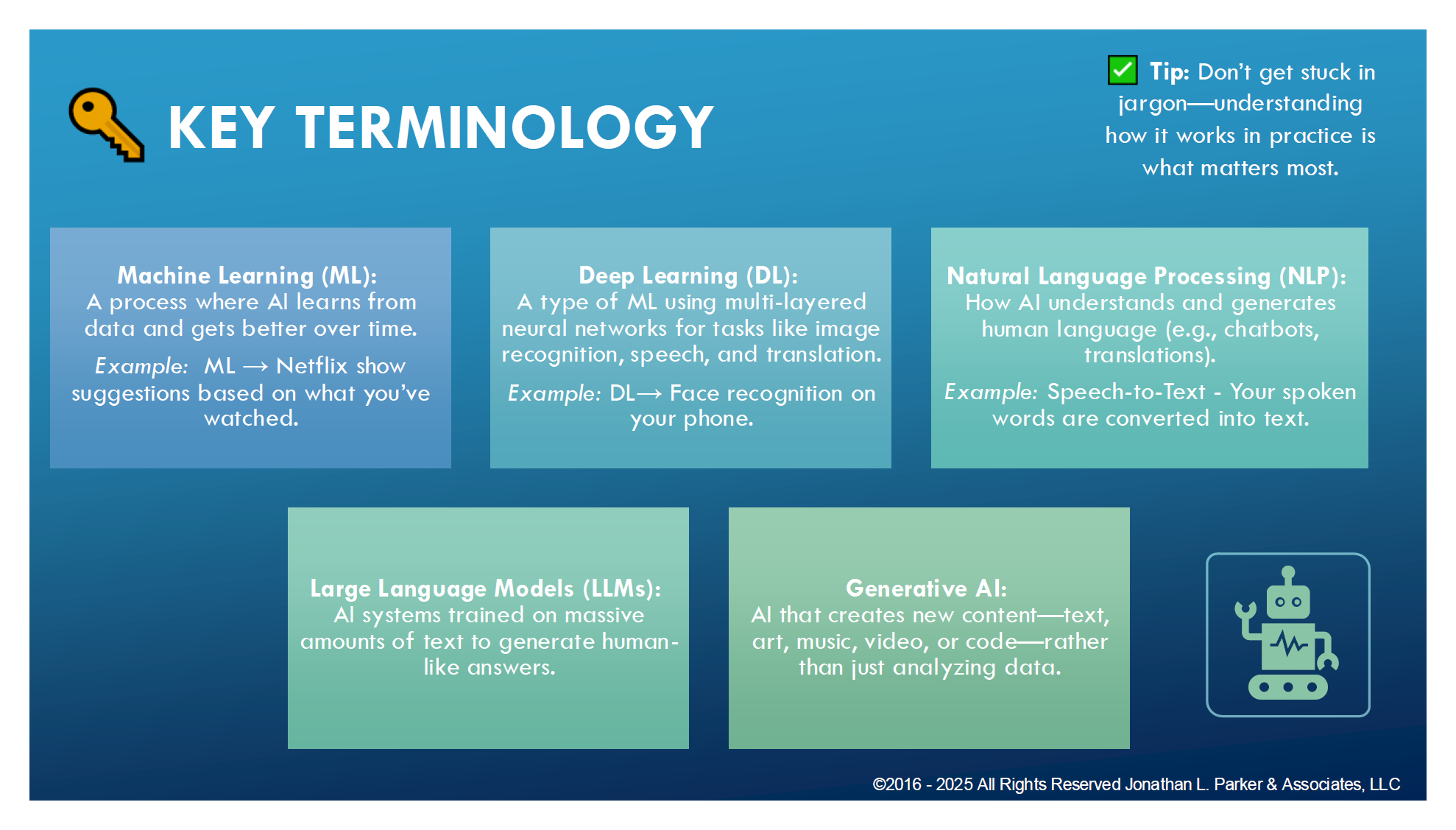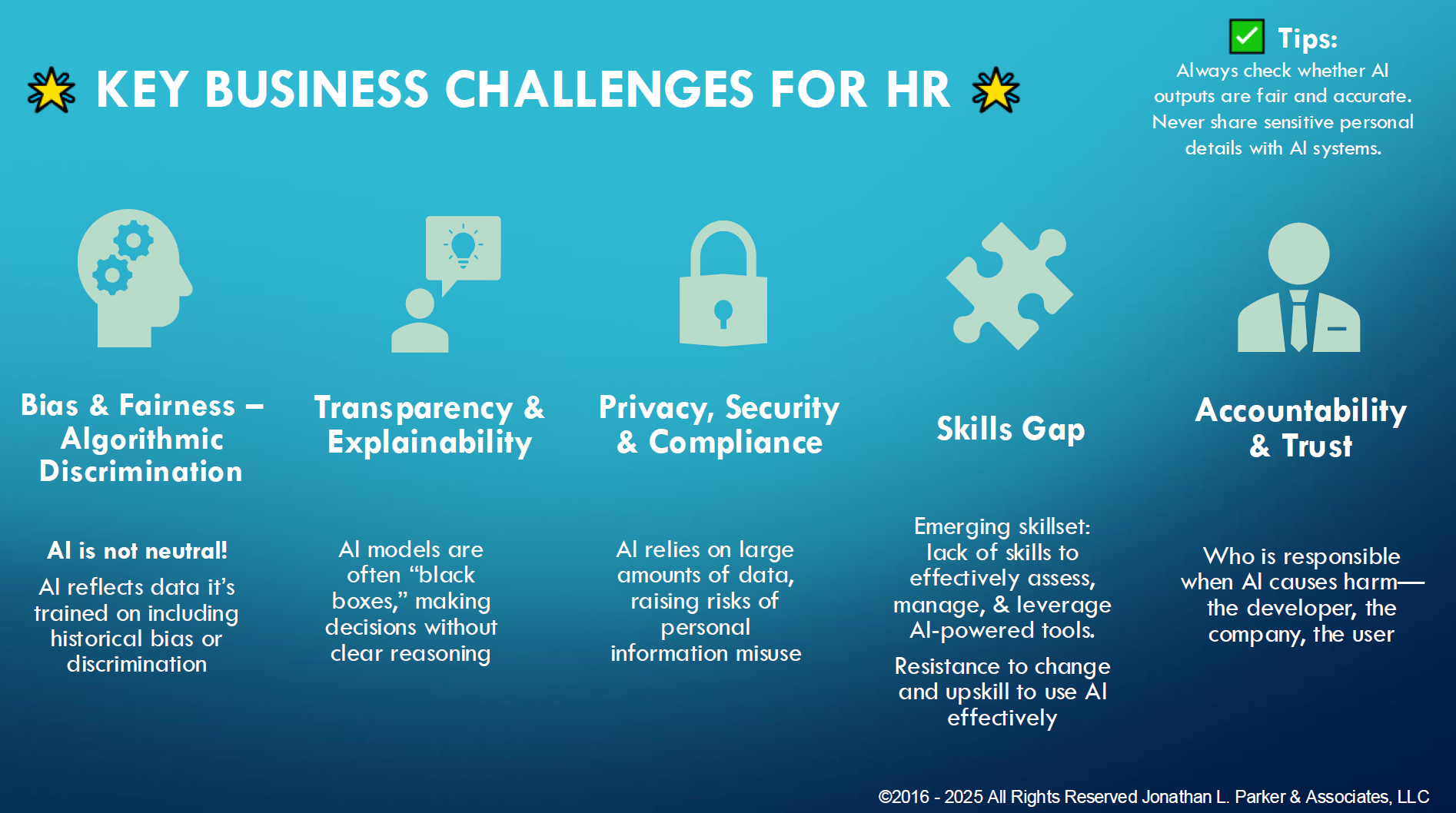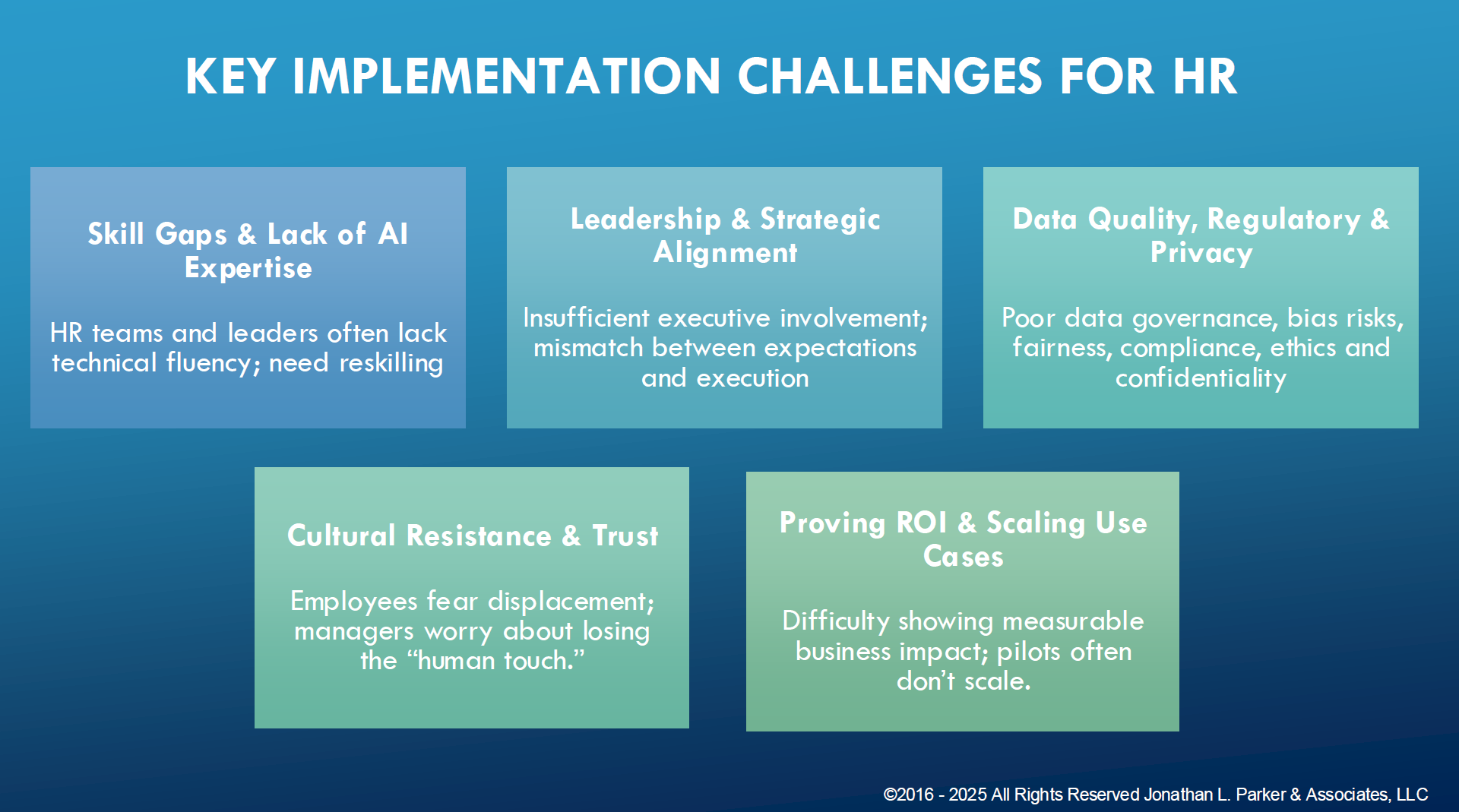AI Forum: Strategic HR Leaders Explore AI Opportunities and Challenges
In early Fall 2025, JLPA led an AI Forum discussion designed to:
Provide a foundational understanding of AI concepts for HR leaders
Explore challenges, opportunities, and risks associated with AI adoption
Engage HR leaders in a discussion about real-world HR use cases
Forum Moderators: Jonathan Parker (JLPA President), Rachel Evans (JLPA Coach & Consultant), and Stephanie Koeshall (AI Consultant/Expert).
Forum Attendees: The Forum was attended by HR leaders whose experience with AI spanned the spectrum from limited to broad adoption, reflecting a mix of company sizes, as well as varying industry regulations/constraints.
Demystifying AI: Essential Knowledge for HR Executives
AI Defined, Concepts & Terminology
Stephanie Koeshall kicked off our forum with an overview of baseline concepts, starting with the following definition.
Stephanie drew the distinction between Machine Learning, Large Language Models, Generative AI (the most common type used today), and future concepts like General & Superintelligent AI (future capabilities). While sharing some of these key terminologies, she advised participants to focus on how AI works practically, rather than the jargon.
Stephanie also outlined key policy initiatives, including Government-led moves to set AI rules. The U.S. has prioritized infrastructure, exports, and standards, and promotes AI literacy through initiatives like the "Presidential AI Challenge" (K-12).
Quality Control: AI's potential for "hallucinations" (fabricated facts) and the need for verification and human oversight were flagged. These can be mitigated by verifying facts, asking for reasoning and citations, keeping a human in the loop, and comparing results across tools when the stakes are high or the output has a direct impact on people.
Navigating the AI Landscape: HR Opportunities and Challenges
“The rapid integration of AI in HR can sometimes risk sacrificing the human touch, especially in areas that require empathy, discretion, and relationship-building, like talent management and employee well-being. Striking a balance between AI’s efficiency and genuine human interaction is crucial for maintaining a supportive work environment.”
JLPA’s Rachel Evans provided an overview of how AI is being used in HR. Using ChatGPT, she began with a summary of the feedback shared by forum participants (submitted via the video conferencing chat feature).
Participants shared a mix of optimism and concern about the impact of AI on HR and the workforce.
Leaders highlighted productivity gains—such as drafting communications, generating presentations, and summarizing notes—but also underscored risks associated with bias, privacy, and accuracy.
The uses, key business opportunities, and challenges faced by HR leaders are illustrated in the following slides. AI shows early ROI in recruiting (screening, first-round dialogues), retention (attrition modeling, chatbots for FAQs), learning (personalized pathways), and general productivity (summarization, drafting, policy search).
In terms of the challenges, Rachel flagged the following:
Risks & Constraints: Significant concerns include bias and fairness, data quality ("garbage in/garbage out"), security and privacy (IP leakage, breach risk).
Skills Gap: The HR skills gap in AI fluency was highlighted. According to SHRM, roughly 1 in 10 HR professionals feels fully prepared, while there is a growing demand for proficiency in AI.
Trust & Culture: Most employees want human handling of sensitive issues. Adoption rates rise when staff feel safe and well-trained. Education, quality gates (fact-checking and bias testing), and guardrails (secure deployments and data-handling rules) were emphasized.
Implementation Challenges: Training and practice on the job are critical, as well as addressing the fear factor. The MIT Media Lab's Project NANDA released a new report that found 95% of investments in general AI have yielded zero returns. There’s clearly a gap between AI ambition and ROI. Leaders are not focused on a defined strategy, on value added, and client results when designing and implementing AI.
“Almost all companies invest in AI, but just 1 percent believe they are at maturity. Our research finds the biggest barrier to scaling is not employees—who are ready—but leaders, who are not steering fast enough.”
How HR Leaders Are Using AI: Case Studies in Adoption
Jonathan Parker led a discussion among HR leaders, who reported on AI adoption strategies they were familiar with.
Companies' AI experience ranges from broad rollouts, including experimentation with tools like Copilot, to cautious pilots.
One participant shared her personal experience, including knowledge of an organization whose HR professionals were required to identify opportunities and implement AI within the function.
Another participant cautioned that professionals who ignore AI are likely to be replaced by those who have knowledge and experience of AI.
One pharma company leader shared that his organization has embraced AI with multiple trainings and Copilot implementation. He contrasted the benefits with the challenges of verification and rework when the results were clearly incorrect.
A balance between efficiency, accuracy, and human touch, as well as speed versus compliance/security, was a recurring theme.
Several attendees noted potential challenges with entry-level roles, where AI might replace more junior positions. Moderators encouraged participants to build AI literacy through experimentation, framing AI as a partner rather than a replacement.
JLPA moderators highlighted the role that AI can play in talent management. President Jonathan Parker cited examples of opportunities to leverage AI in leadership and learning. He advised that his practice was also exploring how JLPA can support its clients on their AI journeys.
Forum Summary and Conclusion
Forum participants concluded that AI is valuable and manageable when education, guardrails, and measurement are in place. The immediate opportunity lies in accelerating everyday HR tasks while protecting people and data, with success dependent on effective human governance, robust bias controls, and clear business objectives.
Let’s Keep the Conversation Going - We’d Love to Hear from You!
Interested in participating in a future AI Forum to learn more about how your peers are using AI in HR?
Do you have examples and lessons learned from using AI in Leadership, Learning, or HR initiatives?
If so, email Jonathan Parker to express your interest and provide your contact information. When we plan another open invitation session, we’ll be sure to invite you.
Reading & References
“AI in HR: How Is Artificial Intelligence Transforming Human Resources?” IMD Business School for Management and Leadership Courses, 14 Oct. 2025.
Furr, Nathan, and Andrew Shipilov. “Beware the AI Experimentation Trap.” Harvard Business Review, 29 Aug. 2025.
Mayer, Hannah, et al. “Superagency in the Workplace: Empowering People to Unlock AI’s Full Potential.” McKinsey & Company, McKinsey & Company, 28 Jan. 2025.
“The Role of AI in HR Continues to Expand.” 2025 Talent Trends: AI in HR, SHRM, 2025.






